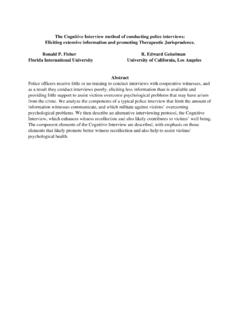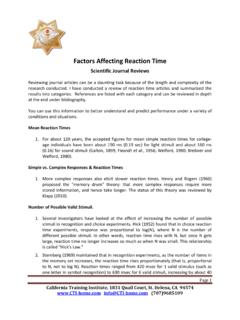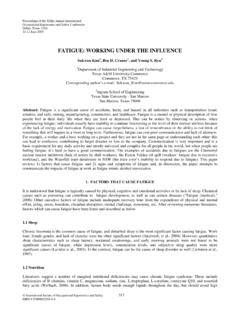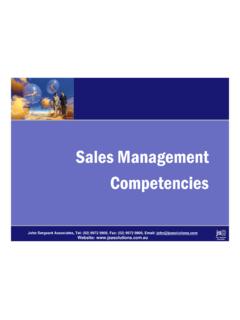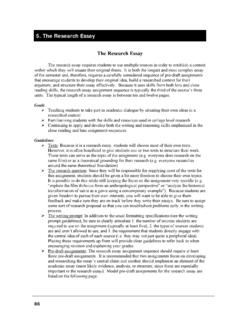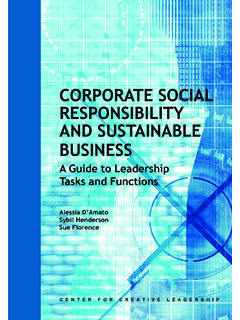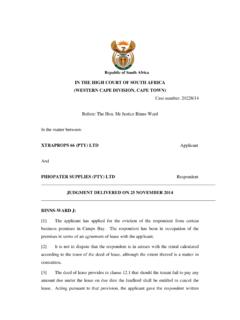Transcription of LEADERSHIP – SKILLS, APTITUDE & EMOTIONAL …
1 LEADERSHIP . skills , APTITUDE & EMOTIONAL INTELLIGENCE. Bob Harrison Police Chief (Retired): Vacaville, CA. Special Consultant: CA Commission on POST. Why do some managers succeed while others fall flat? Why do managers with the professional knowledge and intelligence to promote into positions of critical importance to their organization fail once in place? Although much of our LEADERSHIP training rests on gaining the technical skills and decision-making capacity to deal with the management of a unit or division, leading people in the pursuit of company goals is another matter altogether. In his book EMOTIONAL Intelligence,1 Daniel Goleman developed the concept of EMOTIONAL Intelligence (EI) to describe the phenomena of failed management relationships in the face of intelligence and skill, as well as ways in which to discern those with the right stuff to succeed in LEADERSHIP .
2 Goleman's work gives us an insight into the skills and aptitudes necessary to survive, and even thrive, in today's organizational environment. The EMOTIONAL Intelligence Competencies Figure One Using one's innate intelligence, honed through the acquisition of appropriate technical skill, the aspiring leader forms the basis for success. TECHNICAL COGNITIVE. SKILL ABILITY (IQ). Before discussing the competencies of EMOTIONAL Intelligence, it is important to note that cognitive capacity (IQ and the ability to make decisions2) and technical skills DO matter. They do not, however, comprise the sum total of what one needs to succeed. The intelligence and skill to move into a management position should be considered as foundational assets, or what Goleman terms threshold capabilities 3 of the aspiring manager.
3 That translates to the reality facing each of us; these capacities are a necessary starting point for any aspiring leader. For that reason, most preparatory training, including seminars, police academies, and many collegiate programs give the bulk of their effort to honing the skills and cognitive ability of their student. Rather than viewing such talents as ending points in a manager's development, EI uses them as the mortar to hold together the building blocks of intelligence beyond mere skill or competence. What Is EI? EMOTIONAL Intelligence is the sum total of attributes beyond mere intellect that provides a framework of awareness and deployment as a leader. EI often determines the success or 1.
4 Failure of an individual in a LEADERSHIP setting, providing what others have found difficult to describe as they search for the Holy Grail of LEADERSHIP competency. Goleman notes four components of EI, two of which are internal; the other two being skills regarding one's relationship with others. The Internal Dimensions SELF-AWARENESS. EMOTIONAL Self-awareness Being attuned to one's inner signals, recognizing how one's feeling affect job performance. Leaders attuned to their guiding values can often intuit the best course of action, seeing the big picture and dealing effectively with complex issues. Emotionally self-aware leaders are seen as candid and authentic, speaking openly and with conviction about their guiding vision.
5 Accurate Self-assessment Knowing one's limitations and strengths, exhibiting a sense of humor about themselves. Leaders with high self-awareness exhibit a gracefulness in learning where they need to improve, and welcome critique and feedback. Accurate self- assessment allows a leader to know when to ask for help and where to focus energy. Self-confidence Knowing one's abilities with accuracy allows leaders to play to their strengths. Such leaders have a sense of presence and a self-assurance that lets them stand out in a group. SELF-MANAGEMENT. Self-control The management of disturbing emotions and impulses, channeling them in useful ways. A leader with self-control will remain calm and clear-headed in crisis or under stress.
6 Refraining from acting on impulses also helps others not to see a leader who falls prey to a trying situation, or who lashes out inappropriately. Transparency Living one's values in a manner that is readily seen by others. This conveys and authentic openness about one's feelings, beliefs and actions, which facilitates a perception of integrity. In LEADERSHIP , it allows one to openly admit mistakes or faults, and to confront unethical behavior in others rather than shying away. Adaptability The capacity to juggle multiple demands without losing focus or energy, comfortable with the inevitable ambiguities of life. In LEADERSHIP , this is seen as a flexibility and adaptability to new challenges, data or realities.
7 Achievement High personal standards that drive an effort to improve performance for leaders those with whom they come into contact. This involves a sense of pragmatism, setting challenging goals, but also managing risk appropriately. A hallmark of this competency is one who is continually learning- and teaching- ways to do better. 2. Initiative One with a sense of efficacy- that they have what it takes to control of their own destiny. They seize opportunities- or create them- rather than simply waiting when necessary to create better possibilities for the future. Optimism One who sees opportunities rather than threats, expecting the best in others. Their appropriately positive outlook leads them to expect that emerging circumstances will be for the better.
8 The External Dimensions SOCIAL AWARENESS. Empathy One who is attuned to a wide range of EMOTIONAL signals, allowing them to sense the perceived, but unspoken, emotions in a person or groups. In LEADERSHIP , it creates relationships where persons listen and can grasp the other person's perspectives readily. Empathy enhances understanding across the spectrum of diverse personalities or cultures one may encounter in any organizational setting. Organizational Awareness The capacity to detect crucial social networks and read key power relationships. This enhances one's ability to become politically astute and understand the forces at work in an organization or community, and also fosters the capacity to discern guiding values and unspoken rules.
9 Service The ability to keep relationships with those served on track, monitoring the satisfaction of others in relation to the intended effect. One aspect of this competency would be a spirit of selfless in addressing the needs of persons in a LEADERSHIP relationship. RELATIONSHIP MANAGEMENT. Inspiration One who creates a sense of resonance with others, sharing a compelling vision or shared mission in a manner that engages those who must work to fulfill the future. Inspirational leaders embody what they ask of others, offering a sense of common purpose beyond the daily grind. Influence One who is persuasive and engaging, finding the right appeal for a given listener to enhance buy-in for the future.
10 This is perhaps the core relationship task for any successful leader as they work to develop reciprocity in their work relationships. Developing Others One who shows a genuine interest in those around them, working to enhance the capacity and talents of others. A key underlying competency is the ability to trust, which is necessary for any developmental delegation of work. A strong developer can give timely and constructive feedback, and focuses significant energy to mentoring or coaching those around them. 3. Change Catalyst One who can recognize the need for change, challenge the status quo and champion new courses of action. They can make a compelling argument for their proposition and find practical ways to overcome barriers.
